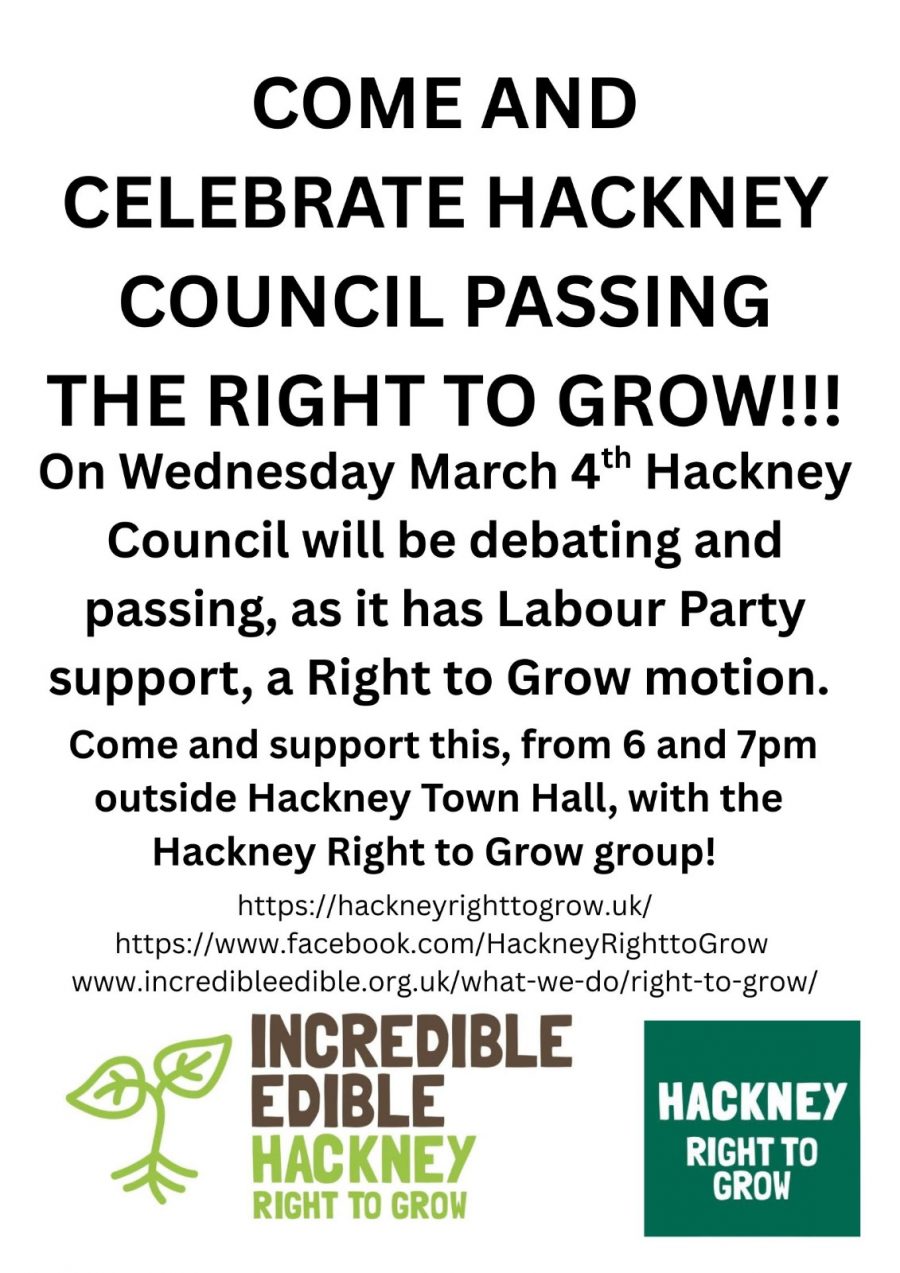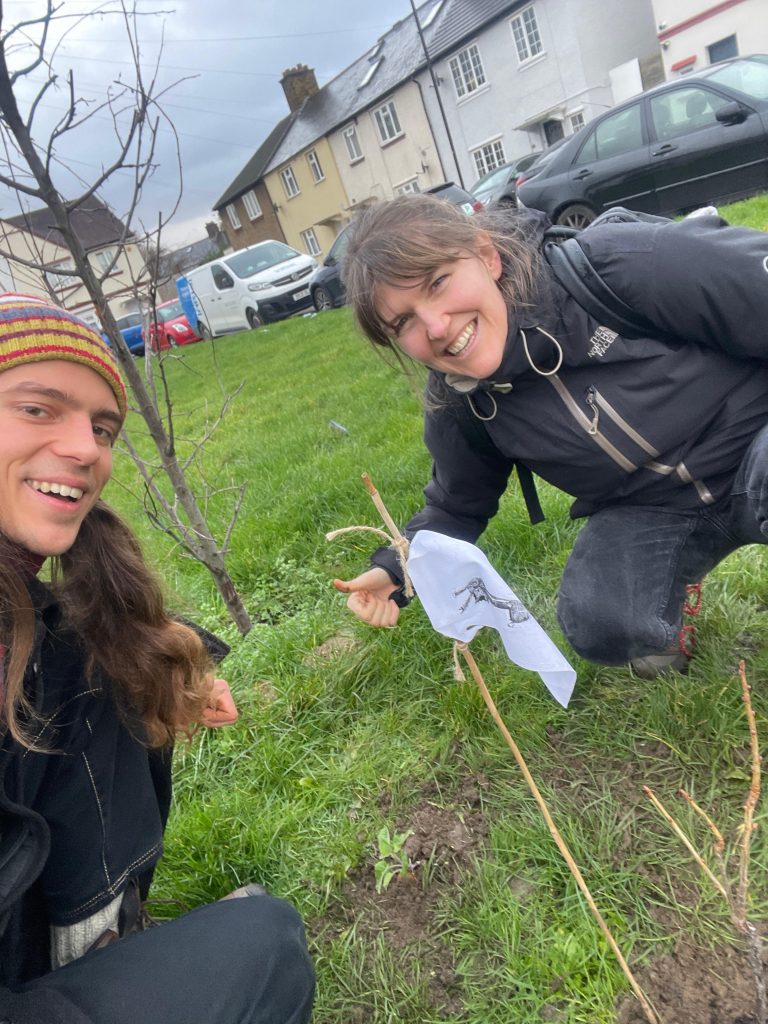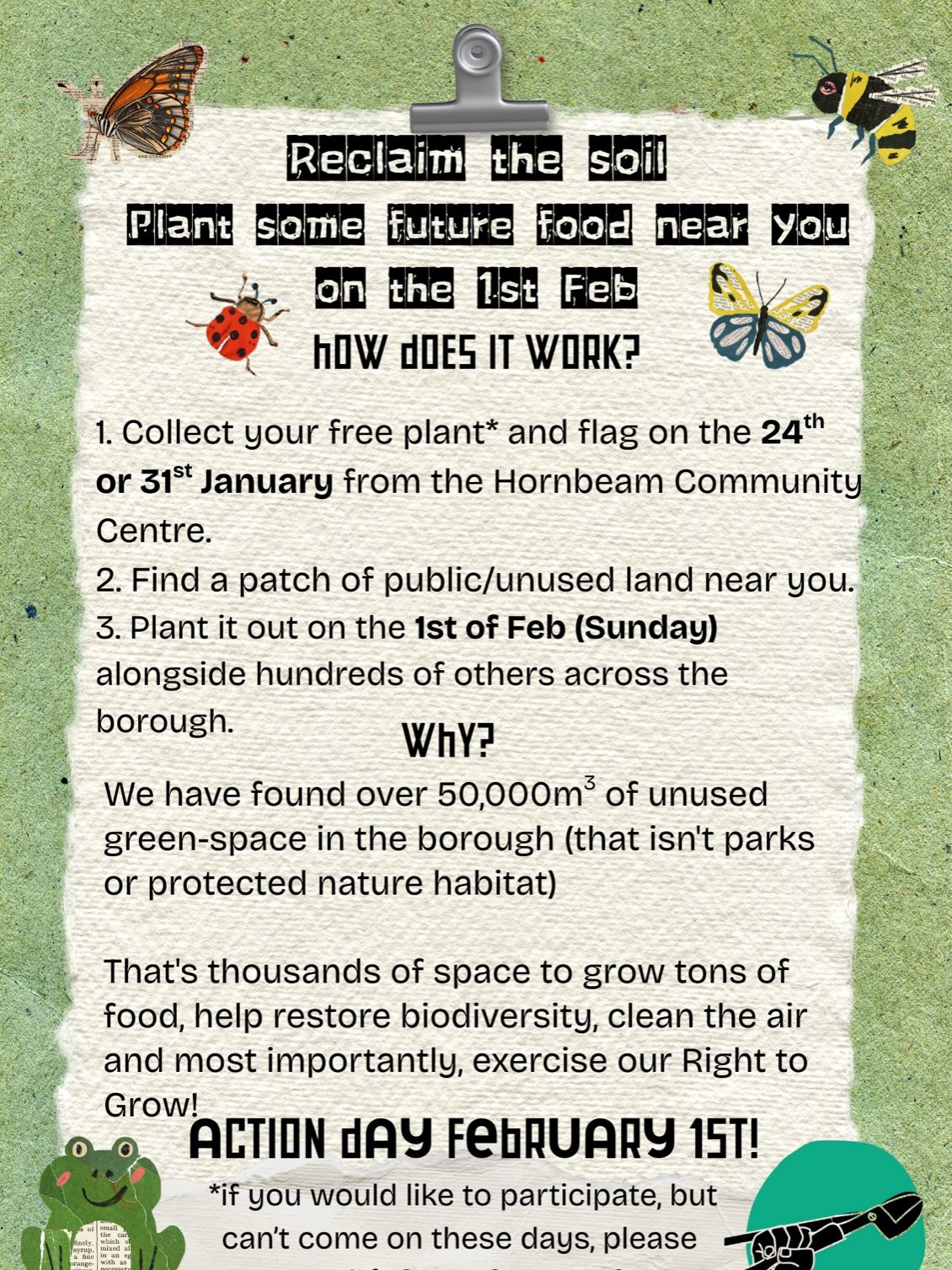Come and celebrate Hackney council passing a Right to Grow motion! Wednesday March 4th! 6-7pm outside the town hall!
Bring banners, placards and veg to wave!

Come and celebrate Hackney council passing a Right to Grow motion! Wednesday March 4th! 6-7pm outside the town hall!
Bring banners, placards and veg to wave!

On Sunday 1 February, residents across Waltham Forest, London, came together in a coordinated borough-wide action to plant edible plants on unused public land, calling for a formal Right to Grow and greater council support for community food growing.
The action, organised by Waltham Forest Right to Grow, supported 18 community groups across the borough to plant food in public spaces. A total of 92 edible plants were distributed to more than 50 local residents, who worked in small groups to plant on underused land in their neighbourhoods.
The Waltham Forest action forms part of a growing national Right to Grow movement, which is calling on councils across the country to formally support residents to grow food on public land. Right to Grow motions have already been passed by councils including Hull and Southwark, with other local authorities exploring similar approaches as demand for community food growing continues to rise.
Campaigners say the issue is increasingly urgent. The action comes off the back of a recent UK government national security assessment warning that global biodiversity loss and ecosystem degradation pose a serious risk to UK food security, with rising exposure to crop failures, supply chain disruption, and global competition for food. The report highlights the need to strengthen local food resilience and ecosystem restoration as part of the UK’s response to these risks .
Organisers say the action was designed to demonstrate both the public demand for and the practical reality of a Right to Grow in Waltham Forest.
The Waltham Forest Right to Grow campaign is calling for:
“People are already growing food, building community, and improving local spaces — often without any formal support,” said a spokesperson for Waltham Forest Right to Grow. “This action shows how much appetite there is for a Right to Grow, and how quickly it can turn unused land into something that benefits everyone.”
The local campaign says council response so far has not matched the level of public interest. Hundreds of residents have already signed up to support the campaign, and more than five new community gardens have formed as a direct result of the campaign in the borough in recent months.
“We’re seeing enormous enthusiasm from residents,” the spokesperson added. “What’s missing is a clear commitment from the council to support this energy and make food growing on public land easier, not harder.”
Waltham Forest Right to Grow is calling on the council to work with residents to create a borough-wide Right to Grow framework that reflects the scale of public support and the urgency of food access, climate resilience, and community wellbeing.
Plants were sourced from four community projects — the Community Apothecary, OrganicLea, the Tree Musketeers in Hackney, and the Welcome Garden — highlighting the strength of existing grassroots food-growing networks in and around the borough.

Is there a patch of land near you which could do with some love? There’s lots of public space in the borough being left unused – we’re going to do something about that! Reclaim the Soil is about taking matters into our own hands, getting them dirty and connecting to the land.

Fantastic to see the RHS “Space to grow: realising the potential of the community gardening movement” report which came out in October and how it highlights the importance of community gardening especially in urban areas” Community gardening in the UK has grown and evolved over time… Community gardening groups come in many shapes and sizes, such as allotments, health centre gardens, school gardens and even shared containers on streets and shared spaces in housing developments. Of those surveyed, 76% are located in urban areas, while the remaining 24% in rural settings.” The report notes “… the top motivation for community gardening groups is bringing the community together – in 85% of cases. This is followed by benefitting participants’ physical and mental wellbeing, encouraging enjoyment of gardening, improving biodiversity and wildlife habitats and creating cleaner, greener or more attractive surroundings.” And continues ” … community gardens are helping us tackle some of the biggest issues of our time, particularly in policy areas that have long been priorities for government: improving people’s health and wellbeing, fostering place-based community cohesion, increasing access to nature and delivering on environmental targets. The body of research pointing to the benefits and impacts of community gardening continues to grow.” I could not agree more! So whether you are engaged in delivering biodiversity gain, or improving health or diet, food kitchens, reducing food waste and composting, or working with mental wellbeing or increasing access to nature, community food growing does this for you! While doing the same for your colleagues in other departments. For Local Government the report states Recommendations for local government
1) Create a local strategy for community gardening
Taking a strategic approach to supporting community gardening would help local authorities and regional mayoralties to deliver against their policy priorities for local residents – including improving health and wellbeing, uniting communities, developing a strong sense of place, restoring nature and delivering on climate-related goals.
Some local authorities have recognised the impact supporting community gardening can have in their areas and are already leading the way with their own strategic approaches to supporting local growing. Southwark Council has appointed two Community Gardening Coordinators to support a network of local community gardens; Greater Manchester Combined Authority has invested millions through its Green Spaces Fund, and East Suffolk’s ‘Field to Fork’ scheme is helping communities grow their own food.
These forward-thinking initiatives highlight the potential of taking a strategic approach to supporting local community gardening.
2) Use the Right to Grow to deliver against local policy priorities Incredible Edible’s Right to Grow campaign urges local authorities to make it easier to identify and access public land suitable for community growing or wildlife projects. It also calls for a simpler process for groups to secure free leases to cultivate the land, and for those groups to have the opportunity to bid if the land is put up for sale.
Right to Grow offers a tangible opportunity for local authorities to deliver on their policy priorities in areas such as wellbeing and social cohesion by supporting local people to grow in their communities. In addition, by enabling community groups to take over underused public spaces, councils could save maintenance costs – which could be repurposed to directly support community growing.
Recommendation:
Local authorities should consider how creating a local strategy for community gardening, or incorporating community gardening into existing strategies, could help them deliver their policy priorities for local residents.
Recommendation:
Local authorities should consider how they could deliver on their policy priorities and ‘green the grey’ by adopting Right to Grow.
The Right to Grow campaign has captured national political attention and continues to build momentum at a local level, with six local authorities adopting Right to Grow to date – including Hull and Bury. The more local authorities that adopt Right to Grow, the more barriers will be dismantled for community growers trying to access land and the more councils will be able to utilise the power of the community gardening movement to help them deliver their policy priorities.”
https://www.rhs.org.uk/get-involved/community-gardening/spacetogrow

Up and down the country public land is being left unloved, costing our local authorities money to care for and giving nothing back to the community in return. Community groups like Incredible Edible have shown that with a little imagination, bravery and TLC these parcels of land can be turned into oases for food and wildlife.
It’s time we were afforded a Right to Grow; an opportunity to take up our seed packets, spades and watering cans, and nourish our communities, without all the hoop-jumping and red-tape so often encountered by those who want to get on and grow food with and for their community. The Right to Grow calls for a new relationship that builds trust between councils and communities, and sees authorities recognise the immense value that community food growers bring to the places we call home. With special thanks to University of Sheffield and Research England for funding the production of this film.
🌱 Find out more about the Right to Grow: https://www.incredibleedible.org.uk/w…
🌱 Report: Benefits of the Right to Grow: https://www.incredibleedible.org.uk/w…
🌱 Council briefing on the Right to Grow: https://www.incredibleedible.org.uk/w…
🌱 How Right to Grow supports existing council policies: https://www.incredibleedible.org.uk/w…
🌱 Join the Right to Grow mailing list and Learning Network: https://mailchi.mp/incredibleedible/n…

Hackney Right to Grow has an open meeting for those who are interested in the campaign and especially if they want to get involved. Wedesday 17th September, 7pm at the Garden of Earthly Delight on Graham Road.

Essential reading re London and food growing. The report of the GLA Environment Committee
“The ’Right to Grow’
The Committee also heard that giving local communities the ‘right to grow’ offers a potential model for expanding access to food growing across London. It follows a similar principle to the approach taken in Southwark – by calling on local authorities to set up a simple process by which communities can apply to access suitable land for food growing.”

Great to see Hull City Council become the first council to officially launch Right to Grow in their locality!
“In September 2023, Hull made history as the first city in the UK to pass the ‘Right to Grow’ motion … affirming its commitment to improving sustainability.
Following this decision, the council is now inviting residents and community groups to bring forward ideas that will turn underused council-owned land into thriving, biodiverse spaces.
The initiative makes council land available for small-scale gardening projects, including the planting of food, plants, wildflowers, and fruit bushes, forming part of the council’s broader strategy to promote green spaces, enhance biodiversity, and support community wellbeing.
By transforming unused council land into vibrant open spaces, the programme seeks to foster a sense of community, improve local environments, and allow residents and community groups to take ownership of their local green spaces.”
We’re running slower than we hoped with our campaign in Hackney but with support from the Mayor of Hackney we hopw this policy will be replicate here at the end of 2025 or into 2026.
If you have ideas where you live in Hackney for community gardens get in touch with us!

Evidence and experience shows us that local food systems can deliver a number of vital benefits. These range from strengthening local economies, increasing farm profitability and encouraging the uptake of nature-friendly farming to creating better jobs in the supply chain, connecting producers with communities and enabling a more accessible and reliable supply of healthy and affordable food.
To enable resilient local food systems to thrive, concerted effort is needed to secure investment in infrastructure and boost citizen support and demand. The Local Food Growth Plan (LFGP) is the culmination of a two year partnership project looking at how to grow the local food sector across the UK. It draws on insights gained from the needs and experiences of thousands of farmers, growers and local food businesses that we work with or represent.
The partnership consists of the Landworkers’ Alliance (LWA), Sustain, Sustainable Food Trust (SFT), Pasture for Life (PfL) and the Food, Farming and Countryside Commission (FFCC). The project was funded by the Rothschild Foundation. This report builds a compelling case and impetus for growth, addresses the challenges identified in the Snapshot Review and recommends actions at local, regional and national levels to solve them.

With 99 per cent of the food and drinks consumed in London being brought in from outside the capital, the Mayor must undertake a London-wide review of food growing sites and identify new land for food growing.
The London Assembly Environment Committee has published its report – London: A Growing City? – which outlines the key barriers to food growing in London, and what the Mayor can do to increase community food growing.
Key recommendations in the Committee report include: